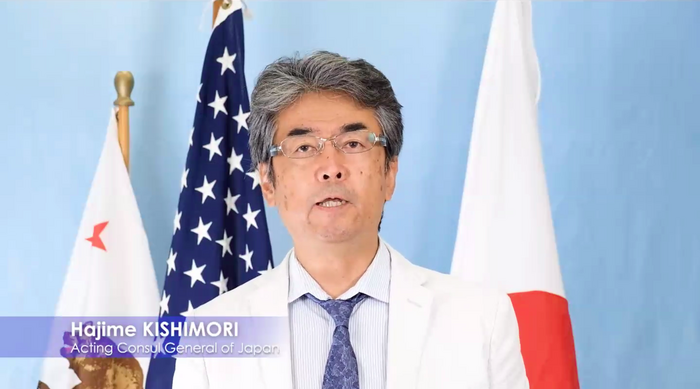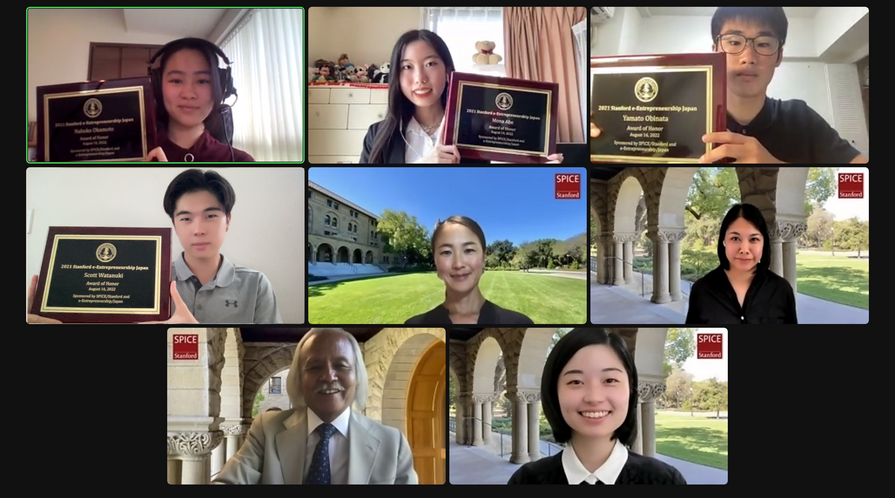SPICE Launches New Course for Students in Wakayama Prefecture
Stanford e-Wakayama is a new distance-learning course sponsored by the Wakayama Prefectural Board of Education and the Stanford Program on International and Cross-Cultural Education (SPICE) at Stanford University. For its inaugural year, 30 high school students were selected from throughout the prefecture to learn from experts in the United States about various academic fields through a global lens. Stanford e-Wakayama instructor Makiko Hirata recently wrote these reflections about her trip to Wakayama Prefecture to attend the opening ceremony, which was held on September 9, 2022.
Located on the southwestern part of Kii Peninsula, the largest peninsula in Japan, Wakayama Prefecture has been referred to lovingly as “Ki no Kuni” (the land of trees) since the 7th century for its vast forest that covers much of the region. In the self-introductory letters that I had requested, my new students had been telling me about their hometowns, the beauty of nature, the kindness of people, and the sweetness of fruits. So naturally, I was looking forward to meeting my students as much as getting to know their environment during my three-day visit. What I was not expecting, however, was how meaningful this visit would become to me through the exchanges I was to have with the educators.
The morning after my arrival, Mr. Masanori Toda, Teacher’s Consultant, Prefectural School Education Division, Wakayama Prefectural Board of Education—my counterpart for Stanford e-Wakayama—introduced me to many of the people responsible for launching this program. They all shared their perspectives on education, hopes for the future generations, and visions for Stanford e-Wakayama. Through these conversations, I learned about Wakayama’s rich history and felt Wakayama residents’ love and pride for their prefecture. There are many important historical figures who were from Wakayama Prefecture. When Mr. Izumi Miyazaki, Superintendent at the Board of Education, realized that I had not heard of one of these beloved figures, Kumakusu Minakata, he insisted that he gift one of the many books from his personal library about this polyglot Renaissance man to me.
Mr. Yasuhiro Fukano, Manager at the Board of Education, informed me that one of the priorities at the Wakayama Board of Education is to build competence and confidence in their students’ English—a key to helping students become global citizens.
At Wakayama Prefectural Toin High School, Mr. Fujimura, Vice Principal, and Mr. Fujioka, Instructor, accompanied Mr. Toda, Mr. Keiji Yoshida, also from the Board of Education, and me to different classrooms where various subjects were being taught. At the end of our visit, we spent an hour with Mr. Shingo Sasai, Principal, who explained that the school was established in 1879, and the aforementioned Kumakusu Minakata was one of its first graduates. I was especially moved by how frankly Mr. Sasai and his colleagues delved into some of our most challenging issues in education, from how to support diverse gender expressions at schools to establishing healthy boundaries with social media while incorporating IT in the curriculum to cultivate globalization.
At the opening ceremony, all 30 Stanford e-Wakayama students were present in their school uniforms. Ms. Keiko Okano from the Board of Education served as the emcee. Mr. Fukano and Mr. Toda encouraged the students to challenge themselves outside of their comfort zones, but also to trust their own abilities and knowledge. Dr. Gary Mukai, SPICE Director, gave a speech about the importance of critical thinking, diversity, and empathy, offering glimpses into his own Japanese American family’s history. In my own speech, I expressed my gratitude for the information technologies that allow us these virtual international exchanges, but at the same time cautioned how virtual communications are only supplements to the physical sharing of a space and time. I emphasized how I wanted them to get to know me in ways that were only possibly while we were physically together.
As the ceremony came to a close, each student gave a short speech from a lectern to introduce themselves, stating their future dreams and ambitions. I was impressed. After their speech, I gave each student a personalized handwritten card that I had prepared, and shook their hands.
I was quite moved when many students waited to greet me personally and to offer me a hug, after the ceremony. Hugging is not a part of the Japanese culture, so I felt that with those hugs, the students were expressing their willingness to go out of their comfort zones and embrace our journey together.
I already feel that this trip has had a significant impact on how we will relate to each other through the course of this Stanford e-Wakayama program, and possibly beyond. I am grateful.
Stanford e-Wakayama is currently one of 11 local student programs in Japan offered by SPICE.
To stay informed of SPICE news, join our email list and follow us on Facebook, Twitter, and Instagram.
Read More

Instructor Makiko Hirata reflects on the launch of Stanford e-Wakayama, SPICE’s newest regional program in Japan.








































